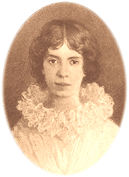 Al Barger recycles the tale that Emily Dickinson had no desire to be published and wrote for no one but herself: “She was a freaky little recluse who showed very little interest in actually publishing her poetry. Renown was of no interest to her.”
Al Barger recycles the tale that Emily Dickinson had no desire to be published and wrote for no one but herself: “She was a freaky little recluse who showed very little interest in actually publishing her poetry. Renown was of no interest to her.”
In fact she went a good deal out of her way to be published, and struck up a correspondence with T.W. Higginson, editor of The Atlantic Monthly and probably the most famous journalist of his time, with exactly that in mind. She was coy about it to be sure, sending Higginson a few poems and asking him “Are you too deeply occupied to say if my verse is alive?” But her intentions were clear enough. Higginson proved himself too thick to understand her poetry. “He seems to have suggested,” her biographer George Whicher writes, “that she abandon the struggle to write in meter and rhyme and follow the example of Whitman.” Her friend Helen Hunt Jackson, the popular novelist, was worse: she published “Success is counted sweetest” without her permission and edited it to boot. (Jackson changed the fourth line to “Requires the sorest need”; the reader can judge the result for himself.) Dickinson finally retreated from society, as Yvor Winters remarked, because she was excluded. She was freakish in the sense of being far more intelligent than her contemporaries.
Dickinson also allowed two other poems to be published in her lifetime, tinkered endlessly with her poems, leaving as many a dozen or more variants of some, and bound them all up carefully to make sure they were preserved. Renown interested her a great deal.
Not that it’s any use to say so. The Dickinson legend appeals profoundly to unpublished writers and it will doubtless live forever.

I’m not saying that Dickinson had absolutely NO interest in having any recognition. She had some small handful of poems published in her lifetime- less than a dozen. I’m no Dickinson scholar, but my understanding is that she got one or two rejection letters, and then quit.
Are you arguing that she TRIED to get recognition, but was heartily rejected by a confederacy of dunces? Maybe she was just very easily discouraged, but one or two rejection letters doesn’t constitute being rejected by society.
My general impression is that she had some small desire for recognition, but very little- not enough to motivate her to make any but a very minimum effort.
I’m arguing that she got discouraged and gave up seeking recognition because the most intelligent people she knew misunderstood her poetry completely. She wasn’t "heartily rejected by a confederacy of dunces"; on the contrary, Higginson and Jackson were both keen to publish her and Jackson went so far as to do so without her permission. They both wanted to change her poetry in stupid ways, and she was diffident enough to prefer to retreat.
She would have profited greatly from intelligent criticism, and sought it, but she couldn’t find any peers, or near-peers, in her narrow social circle. Essentially she was a recluse because she knew nobody worth talking to.